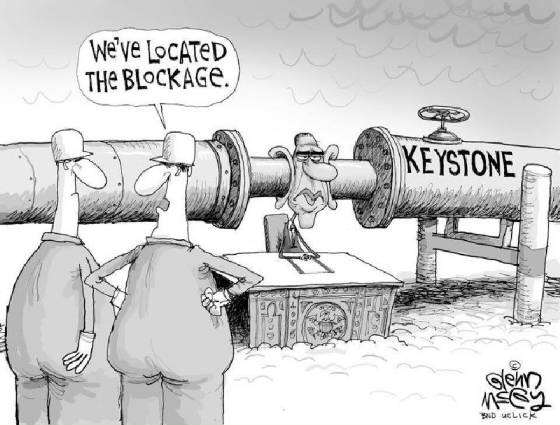
KEYSTONE PIPELINE BLOCKAGE
James Hall

Prior to the environmental cohorts starting a run on shorting railroad stocks, opponents move to stop Keystone pipeline, altogether. "The opposition effort is now focused on Secretary of State John Kerry, who will make a recommendation to President Barack Obama on whether to green-light the project."
In order to leap to the high moral ground, that fearless leader of foreign policy must be instilled with a new sense of abandoning the Middle East oil rich gulf region for a new austerity on fossil fuel resources. Here is a sample of the tortured logic from the Barron of restraint and sacrifice.
John Kerry: The Science Is Screaming At Us, states:
"Though he uses the flip side of Pascal's Wager, which he restates as "What's the worst that can happen?" Kerry adopts the same basic argument in his Ross Sea speech, in which he makes the case against climate change skeptics:
"What if the other people are wrong and we are right; what's the worst that can happen? The destruction of the ecosystem as we live with it today."
Given that choice, as a matter of public responsibility it makes common sense to configure public policy around the available science and adopt a vigorous plan to reduce carbon emissions."
Sure the global warming fear mongers want you to adopt their weird science as fact, while they go to extreme means to deny or suppress the economic realities that all of us must deal with. Remember that the transportation of choice for attending Keystone Pipeline demonstrations are fueled by gasoline or diesel, not their hallowed wind generated electric vehicles.
The Chicago Council on Global Affairs report, In Support of Canadian Oil Sands counters the hysteria of often-criticized techniques used to extract liquid gold from the Western Canadian Sedimentary Basin (WCSB) in Alberta, Canada.
"Now, the environmental concerns. Canada works hard to mitigate the impact of oil sands development. In August we took a trip to visit a national laboratory devoted to this pursuit entirely. Canada's practices are equal or better than anything required in the U.S. Yes, oil sands mining operations are not pretty, but then again, neither is coal mining or heavy industry - in the U.S. or elsewhere. The focus should be on whether the activities are carried out with appropriate environmental protections and attention to reclamation. Moreover, most future growth in oil sands development will use so-called in situ technologies that extract oil without surface mining, resulting in less environmental impact and a lower greenhouse gas footprint."
As for environmental concerns for the Keystone Pipeline itself, The Edmond Sun editorial sums up quite nicely.
"Earlier this month, the U.S. Department of State revised an environmental impact statement for the 875-mile Keystone XL pipeline. The report contains no conclusive environmental reason for the pipeline not to be built, said Congressman James Lankford, R-Edmond.
"Fortunately for people in my state of Oklahoma and states around us, the administration is running out of excuses to continue delaying the Keystone XL pipeline," Lankford said. "The last major pipeline from Canada took 27 months to approve by the Obama Administration State Department. So far, the Keystone XL pipeline has consumed 53 months in permitting and administration delays."
The Washington Times item, Unlocking the Keystone pipeline illustrates some of those nasty facts that cause the political blockage from an administration that is bent on fostering an unrealistic energy policy.
"While Mr. Obama says he's all in for boosting oil and gas production, a report by the nonpartisan Congressional Research Service contradicts him. The record of fossil-fuel production during his tenure reveals that nearly every recent increase in oil and natural-gas production was on state-owned and private property, not federal land. U.S. oil production has increased by 1.1 million barrels per day between fiscal 2007 and 2012 on state and private land, but has fallen by 7 percent on federal land. For natural gas, production since 2007 has grown by 4 trillion cubic feet - up 40 percent on state and private land, but down by 33 percent on federal land.
The Congressional Research Service places partial blame on a slowdown in the federal drilling-application process. From 2006 to 2011, the average time needed to approve applications has risen from 218 days to 307 days. The complexity of paperwork involved in getting the government's approval of drilling sites inhibits production and contributes to higher prices at the pump."
Significance of the Seven Reasons Why Obama Will Approve the Keystone Pipeline arguments what should be of especial concern for John Kerry at the State Department:
"If the oil doesn’t head south of the Canadian border, it will head west to China, which craves cheap oil for its military build-up and its metastasizing territorial claims in East Asia, which it is Obama’s stated policy to vigorously oppose."
The Oil Roustabout Economy is here to stay for the near future. If the country is to reduce reliance on foreign oil from unstable sources, the manifest alternative is to tap our friendly neighbor to the north and the resources domestically in the route of the Keystone Pipeline. "Since the environmentalists base their cosmos on shifting sand, why not go for the real stuff?" Commerce in petroleum is fluid and spongeable, crossing all borders. The artificial political obstruction, which delayed and added gratuitous costs to a utilitarian project, violates our real national security.
James Hall – March 27, 2013
http://www.batr.org/negotium/032713.html
